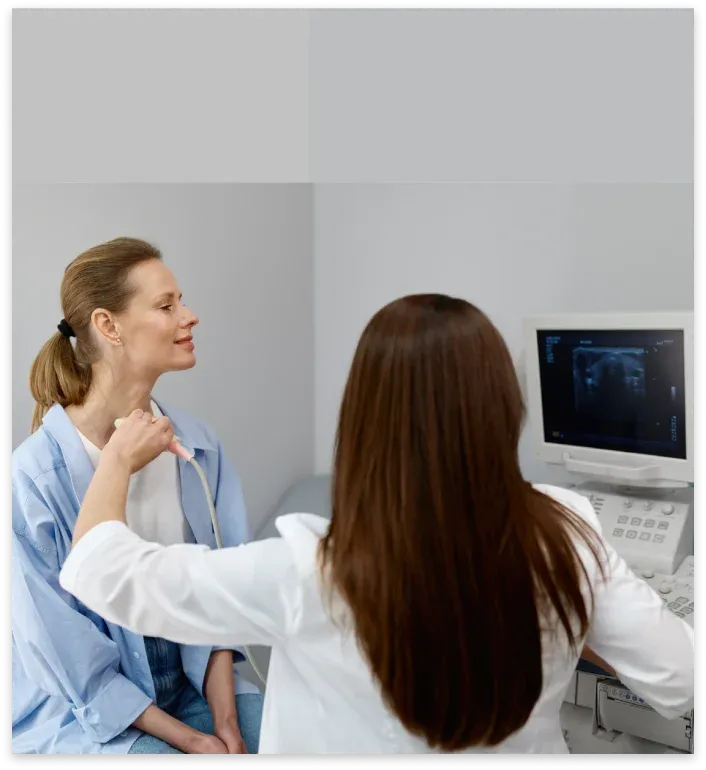
Professional Expertise
Our in-house endocrinologist is ready to help revive your healing journey despite the wide and complex nature of endocrine disorders and dysfunctions.
Manage Your Thyroid Comprehensively with R-Endocrinology
Manage Your Thyroid Comprehensively with R-Endocrinology
What is Thyroid?
The thyroid is an endocrine gland, basically a ductless gland that secretes hormones directly into the bloodstream. Located on the front side of the neck, right under the skin, the thyroid is a small, butterfly-shaped gland that produces hormones and, through those hormones, is mainly responsible for regulating body temperature, blood pressure, heart rate, metabolism, growth, and development of the human body. Dr. Rizvi, under R-Endocrinology, has expertise in this subject and is known for diagnosing, treating, and managing thyroid-related issues.
Thyroid Disorders:
The thyroid gland is supposed to release certain hormones in the bloodstream. Two prominent hormones released by the thyroid are triiodothyronine (T3) and thyroxine (T4); they also release calcitonin, which is vital for bones. Thyroid disorders refer to medical conditions where the thyroid gland is not producing the right amount of hormones. In this case, it is either over-producing the hormones or under-producing them. This disrupts the activities performed by thyroid hormones and can then affect weight, moods, heart rate, digestion, etc.

Causes of Thyroid Disorders:
As mentioned earlier, thyroid disorders and their symptoms are majorly dependent on the amount of hormones released by the gland. Either the gland is producing more hormones than required or less hormones than required.
There is a chance that thyroid disorder is caused when the body’s immune system attacks the thyroid gland.
Types of Thyroid Disorders:
Some of the thyroid disorders are discussed as follows:
Goiter:
Goiter refers to the enlargement of the thyroid gland. The primary cause of this condition is iodine deficiency. The symptoms include:
- Exhaustion and fatigue
- Disturbed stool cycle, constipation
- Drowsiness
- Skin getting drier
- Higher sensitivity to cold
Hyperthyroidism:
Hyperthyroidism is a condition where Thyroid activity is more than required. In simple words, when the thyroid produces too many hormones, it causes a situation where the functions of the body associated with the thyroid speed up too much. The causes of Hyperthyroidism include excess thyroid hormonal medication, iodine deficiency, and thyroid inflammation. One of the most common causes of Hyperthyroidism is Grave’s disease. The symptoms include:
- Restlessness, anxiety-like condition
- Disturbed sleep cycle
- Increased heartbeat
- Unexpected weight loss
Hypothyroidism:
Hypothyroidism is the opposite of Hyperthyroidism. It is a condition where the thyroid is less active than it should be and produces less than required hormones. As a result, the functions associated with the thyroid are delayed, stalled, and inefficient. The leading causes of Hypothyroidism include strong medication, iodine deficiency, thyroiditis, etc. The symptoms might consist of:
- Exhaustion
- Depression and low mood
- Excessive weight gain
- Low heart rate
- Constipation
Hashimoto’s Thyroiditis:
An autoimmune condition where the thyroid swells or gets inflammatory. It can cause goiter.
Thyroid Tumors:
Thyroid tumors, also known as adenomas, can be classified as non-malignant growths inside the gland that can lead to Hyperthyroidism.
Thyroid Cancer:
Thyroid cancer can be caused by exposure to any radiation, more specifically to the neck, chest area, or head. It can occur without these known risk factors, too.
Thyroid Disorders in Women:
Thyroid imbalance in women can have an impact on menstruation, fertility, pregnancy, and the postpartum period of women. In pregnant women, thyroid passes hormones to the fetus, which can often lead to Hypothyroidism, which is treatable. Postpartum period in women can be characterized by Hyperthyroidism or Hypothyroidism, which is again manageable.
Techniques to Diagnose Thyroid Disorders:
If a person feels symptoms related to the thyroid disorders mentioned above, the immediate action should be to consult a competent doctor. R-Endocrinology is an ideal place for anyone experiencing such symptoms who has no idea how to proceed with the treatment. The medical experts at R-Endocrinology will guide the patients and treat and manage them to their satisfaction.
R-Endocrinology offers services regarding all the conditions mentioned above and has Dr. Rizvi’s credible and internationally recognized presence to manage, treat, and diagnose the issues and conditions.
To get the diagnosis of thyroid, the following are the most commonly used, accepted, and recommended procedures:

Blood Tests:
Blood tests are conducted to gain insight into the level of hormones produced. They are done mainly to determine the function of the thyroid. The two most commonly conducted tests are supposed to check thyroid-stimulating hormone (TSH) or T4 (thyroxine) levels.
Imaging Tests:
Image tests are often conducted in cases where there is a doubt of nodules or enlargement in the thyroid gland. The ultrasound test is meant to bring forth any growth, cyst, or unrequired and inconsistent presence that later might be diagnosed and treated accordingly. Image tests can detect growth, but they are not enough to differentiate any cancerous or non-cancerous growth. More sophisticated scans are conducted for that purpose.
Thyroid Scans:
Thyroid scans are conducted to observe the working of thyroid nodules. A thyroid scan is typically done by inducing radioactivity in iodine. As iodine is picked up or accessed by the thyroid gland in the body, this kind of imaging test shows how thyroid tissues access iodine;
it would specify if an area is taking up excess iodine, would be an area releasing more hormones, and an area taking up less iodine would correspond to the area releasing less than required hormones. The area with less hormonal production, called “cold nodule,” might sometimes represent cancer.
Thyroid Biopsy:
Thyroid biopsy takes a thyroid cell or tissue for in-depth examination that a trained physician generally carries out. It is mostly done when the presence of cancerous cells is doubted in the thyroid gland.
R-Endocrinology has all these tests available, which are pivotal for the diagnosis. No disease can be treated or managed correctly if the doctor and the patient keep swinging between unnecessary tests; it wastes time, energy, and money. At R-Endocrinology, we have Endocrinology experts under the able supervision of Dr. Rizvi, who have sound experience and knowledge of their fields and conduct tests in the best possible manner in a safe and hygienic environment.
Treatment of Thyroid Disorders:
To treat the thyroid disorders, various methods can be made use of.
Treatment through Medication:
Thyroid disorders can be treated through medication. Various kinds of medicines are used to treat various issues. If the thyroid is producing excess hormones, medicine can be given to reduce the production of hormones. If the thyroid is producing less hormones, synthetic hormones can be given to increase the production of hormones. Various medicines are also given to treat symptoms like increased heart rate, body temperature, digestion issues, etc.
Treatment through Surgery:
Surgeries are conducted in case of enlargements, goiter, or excessively performing nodules. In case of the possibility of cancer, surgery is also performed. If a thyroid gland is entirely removed, medication for producing synthetic hormones becomes mandatory.
R-Endocrinology offers these sophisticated treatments and surgeries and has a record of phenomenally managing patients. Under this roof, a patient would be treated with utmost respect, empathy and compassion as well as exceptional and technologically advanced techniques would be used to address the concerns. Once treated, patients are called for follow-up. We believe in maintaining a cordial and long-term relationship with our customers. We offer our services 24/7 and have the best doctors and professionally trained staff to ensure our patients have nothing to complain about once they leave the premises.
contact us
Get in Touch with us

Make an Appointment
Book Your Online Consultation Now
Manage your endocrine disorders without the hassle of visiting in person. Receive timely consultations without long waiting times and improve your health.



